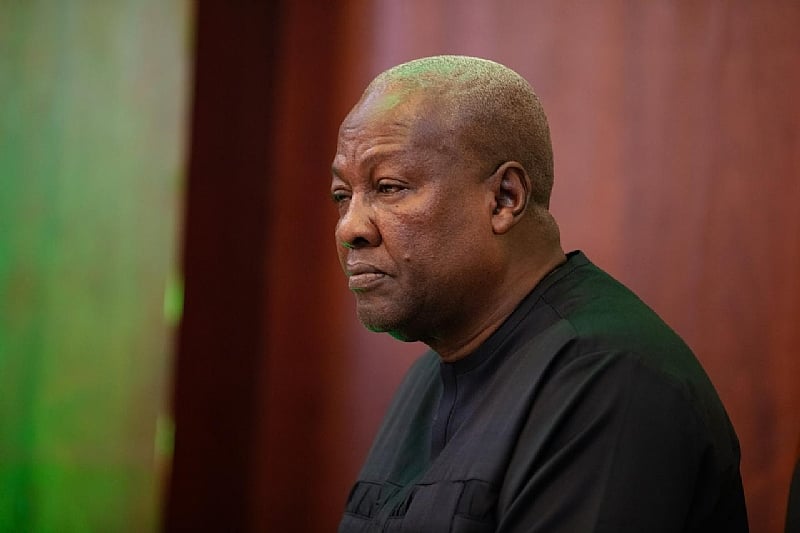President John Dramani Mahama of Ghana has embarked on an intensified campaign against illegal mining, commonly known as “galamsey,” reaffirming his administration’s unwavering commitment to preserving the nation’s natural resources. This renewed effort signals a decisive stance against the destructive practices that have ravaged Ghana’s forests and waterways, threatening both the environment and livelihoods. At a recent media briefing, President Mahama categorically stated that no company has been granted authorization to mine within forest reserves since he reassumed office. This unequivocal declaration underscores the government’s dedication to protecting these vital ecosystems from further degradation. The President outlined a multi-pronged approach encompassing legislative reforms, enhanced enforcement, and environmental rehabilitation.
Central to the government’s strategy is the repeal of Legislative Instrument (LI) 2462, which currently allows mining activities within forest reserves. This legislative action will formalize the administration’s existing policy of prohibiting such operations, providing a stronger legal framework to combat illegal mining. By removing the legal ambiguity surrounding mining in forest reserves, the government aims to eliminate any loopholes that might be exploited by illegal miners. This decisive step demonstrates a commitment to aligning legal provisions with the government’s practical enforcement actions, effectively solidifying the ban on mining in these protected areas.
Beyond legislative reforms, the government has implemented robust enforcement measures to curtail illegal mining operations. President Mahama reported significant progress in reclaiming territory previously overrun by illegal miners. Nine forest reserves have been successfully repossessed and are now under the constant surveillance of the military, ensuring their long-term protection against future encroachment. This proactive deployment of security forces signifies a clear resolve to prevent the resurgence of illegal activities within these critical ecological zones. The government’s commitment to maintaining a permanent military presence underscores the seriousness with which it views the threat posed by illegal mining to Ghana’s natural heritage.
In recent months, a concerted effort to confiscate equipment used in illegal mining has yielded substantial results. Over 440 excavators, more than 1,400 water pumps, and 300 chamfang machines have been seized, disrupting the operational capacity of illegal mining operations. This targeted approach aims to dismantle the infrastructure that enables galamsey, making it increasingly difficult for these illicit activities to continue. The government is simultaneously bolstering its security presence in affected areas. Currently, 980 security personnel are deployed to protect rivers and reserves, and an additional 1,020 recruits are slated to join their ranks by the end of the year, bringing the total force to 2,000. This significant increase in security personnel will enhance the government’s capacity to monitor and enforce regulations against illegal mining throughout the country.
Recognizing that enforcement alone is insufficient to address the damage already caused by illegal mining, the government has prioritized environmental rehabilitation as a crucial component of its strategy. Feasibility studies for water restoration projects are currently underway, laying the groundwork for comprehensive efforts to revitalize polluted water bodies and reclaim degraded lands. This focus on restoration underscores the government’s commitment to not only halting the destructive practices of illegal mining but also actively working to reverse the environmental damage inflicted. The rehabilitation projects aim to restore the ecological integrity of affected areas, ensuring the long-term health and sustainability of Ghana’s natural resources.
Complementing these efforts is the implementation of a sophisticated tracking system for all imported earth-moving machinery. This initiative, undertaken in collaboration with the Transport Ministry, Customs, the DVLA, and the Minerals Commission, aims to enhance oversight and prevent the illicit use of heavy equipment in illegal mining operations. To date, 1,015 excavators and other mining equipment have been registered and fitted with tracking devices, with hundreds more currently undergoing the process. This comprehensive tracking system will provide real-time monitoring of equipment movement, enabling authorities to quickly identify and respond to any suspicious activities. By increasing transparency and accountability in the use of heavy machinery, the government seeks to minimize the risk of such equipment being diverted for illegal purposes. President Mahama has emphasized that this comprehensive campaign against illegal mining is part of a broader environmental protection agenda, demonstrating the government’s commitment to safeguarding Ghana’s natural resources for present and future generations. This integrated approach, combining legislative reforms, robust enforcement, environmental rehabilitation, and technological advancements, reflects a determined effort to combat the complex challenges posed by illegal mining and ensure the sustainable management of Ghana’s invaluable natural wealth.














